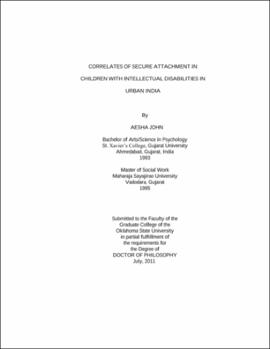| dc.contributor.advisor | Morris, Amanda Sheffield | |
| dc.contributor.author | John, Aesha James | |
| dc.date.accessioned | 2013-12-10T18:04:19Z | |
| dc.date.available | 2013-12-10T18:04:19Z | |
| dc.date.issued | 2011-07 | |
| dc.identifier.uri | https://hdl.handle.net/11244/7703 | |
| dc.description.abstract | Scope and Method of Study: The study aimed at identifying the correlates of attachment security among children with intellectual disabilities residing in urban India. To this end, survey and observational data were collected from 47 children, their mothers (n = 47) and their teachers (n = 22). Mothers completed surveys to describe children's secure-base behavior and teachers reported on children's functioning through the Vineland adaptive behavior scales. The mother-child dyads participated in a semi-structured observation; the dyadic observations were subsequently coded for maternal and child emotional availability. The data were analyzed to test an indirect effects model hypothesizing an indirect association between (a) maternal emotional availability and child attachment security through child emotional availability and (b) child functioning and child attachment security through child emotional availability. Age and gender differences were explored for all the variables in the model. | |
| dc.description.abstract | Findings and Conclusions: With the exception of one variable pair-maternal emotional availability and child functioning-all variables of interest were significantly correlated. Findings of mediation analyses indicate that children's emotional availability mediates the association between maternal emotional availability and child attachment security as well as the link between children's level of functioning and their attachment security. The examination of gender differences indicate that the girls in the sample were at a greater risk of insecure attachment as compared to the boys. Analyses of age differences indicate lower levels of functioning among the older children. Overall, the findings underscore the salience of children's emotional availability for secure attachment among children with intellectual disabilities. The study findings generated through data from multiple informants and multiple methodologies make an important contribution to the extant literature on socio-emotional development among children with intellectual disabilities. | |
| dc.format | application/pdf | |
| dc.language | en_US | |
| dc.rights | Copyright is held by the author who has granted the Oklahoma State University Library the non-exclusive right to share this material in its institutional repository. Contact Digital Library Services at lib-dls@okstate.edu or 405-744-9161 for the permission policy on the use, reproduction or distribution of this material. | |
| dc.title | Correlates of secure attachment in children with intellectual disabilities in urban India | |
| dc.contributor.committeeMember | Halliburton-Tate, Amy L. | |
| dc.contributor.committeeMember | Harrist, Amanda W. | |
| dc.contributor.committeeMember | Merten, Michael | |
| dc.contributor.committeeMember | Page, Melanie C. | |
| osu.filename | John_okstate_0664D_11521 | |
| osu.accesstype | Open Access | |
| dc.type.genre | Dissertation | |
| dc.type.material | Text | |
| dc.subject.keywords | attachment security | |
| dc.subject.keywords | child functioning | |
| dc.subject.keywords | india | |
| dc.subject.keywords | intellectual disability | |
| dc.subject.keywords | mediation model | |
| dc.subject.keywords | parent-child interaction | |
| thesis.degree.discipline | Human Development and Family Science | |
| thesis.degree.grantor | Oklahoma State University | |
